LIFE IN A FACTORY TOWN
Ashton residents face uncertain future as canning plant teeters on the brink of closure
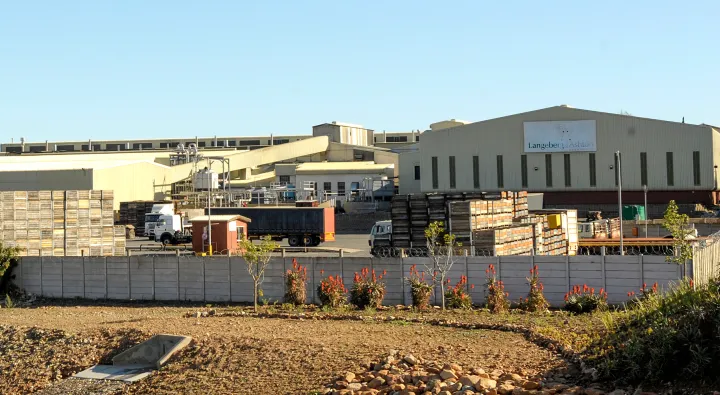
What makes a town tick? In Ashton, Western Cape, the answer comes down to one facility – the Langeberg and Ashton Foods canning plant. The factory faces one season of operations before it is either bought over or shut down. During a recent visit, Maverick Citizen sought to understand the many ways in which the future of the plant and the town are intertwined.
The past few months have been filled with uncertainty for the residents of Ashton in the Langeberg Municipality of the Western Cape. A small town 173km from Cape Town, Ashton relies almost exclusively on one facility for its continued survival – the Langeberg and Ashton Foods (L&AF) canning plant.
The plant is the dominant feature of the town. Set alongside the R60, the main road through the area, it takes up large tracts of land on either side of the Kogmanskloof River. At key points throughout the day, men and women in green or blue uniforms stream from the gates, to visit nearby shops during a break or make their way home after a shift.
Among the products produced by the L&AF plant are canned fruit and fruit purees, largely for the export market.
In June 2022, Tiger Brands – the company under which the L&AF plant falls – announced that it would hold a 60-day consultation period with the intention of closing the factory, bringing an end to more than 70 years of operations.
The announcement came two years after Tiger Brands stated its intention to exit the deciduous fruit business. In the intervening time, the company had sought a buyer for the L&AF plant but had failed to reach an agreement with any interested parties.
The imminent closure sparked widespread alarm in Ashton and the surrounding region.
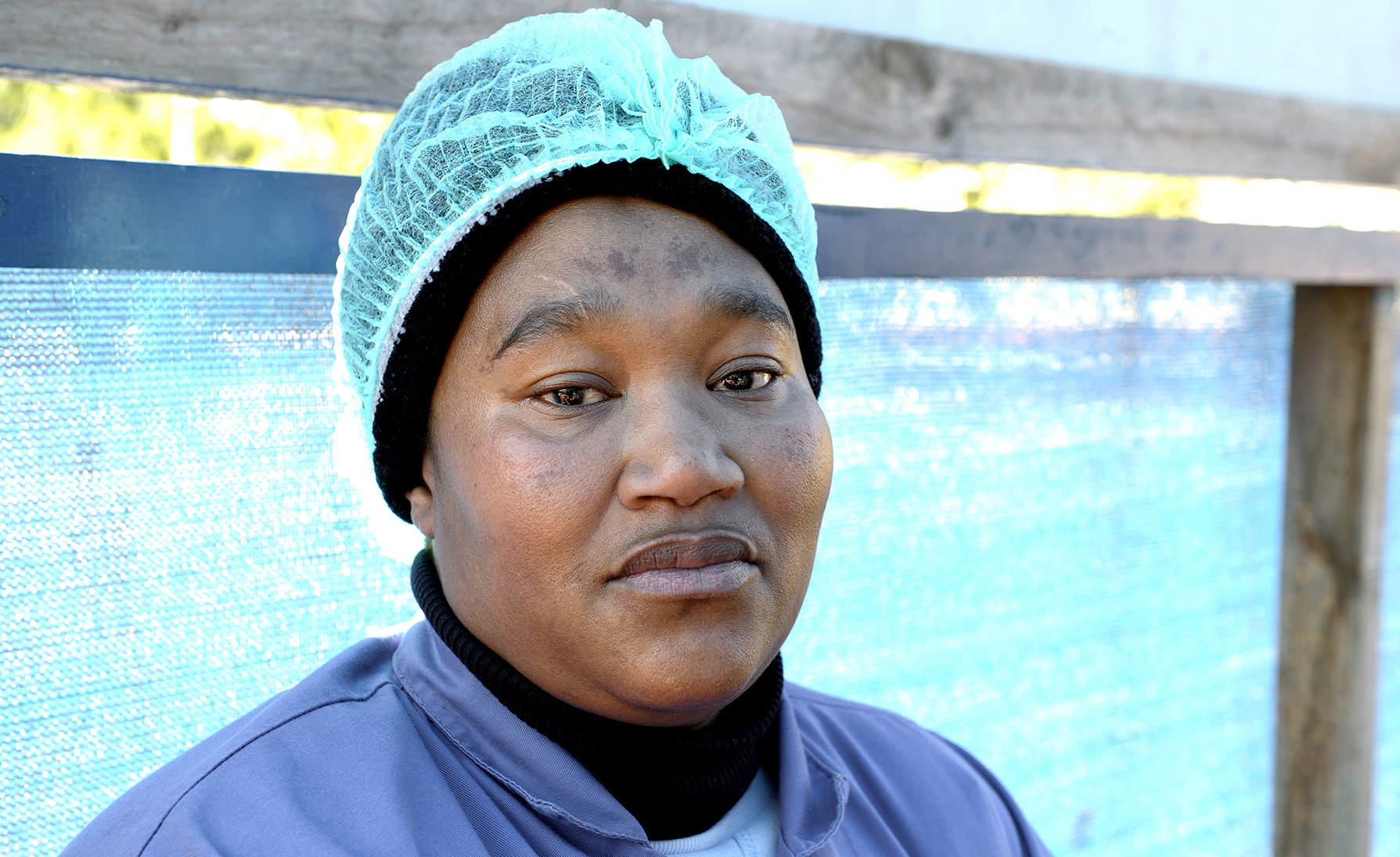
The closure of the canning plant would have turned Ashton into a ghost town, says Nompumelelo Jacobs, a worker at the factory. (Photo: Joyrene Kramer)
“All of us are dependent on this factory,” said Nompumelelo Jacobs, a factory worker and resident of Ashton. “So, it was going to be a ghost town and it was just going to be quiet. And the hunger was also going to be there… everyone was going to starve. We were going to suffer, all of us.”
However, on 12 July, Tiger Brands announced that it would extend operations at the L&AF plant for another season – a decision that would allow potential buyers more time to raise the capital needed to take over the facility.
“The decision was taken after a compact was agreed upon with organised labour, L&AF employees and members of the Canning Fruit Producers Association that allows the company to undertake the significant risk required to operate the business for the forthcoming season,” stated Tiger Brands in a press release.
While the life extension of the plant has been a source of relief for the broad network of individuals and businesses that rely on it for income, some uncertainty around its longevity remains.
To gain a better understanding of the importance of the plant’s survival, Maverick Citizen visited Ashton and spoke with residents from various walks of life, including factory workers, educators, business owners and nearby farmers.
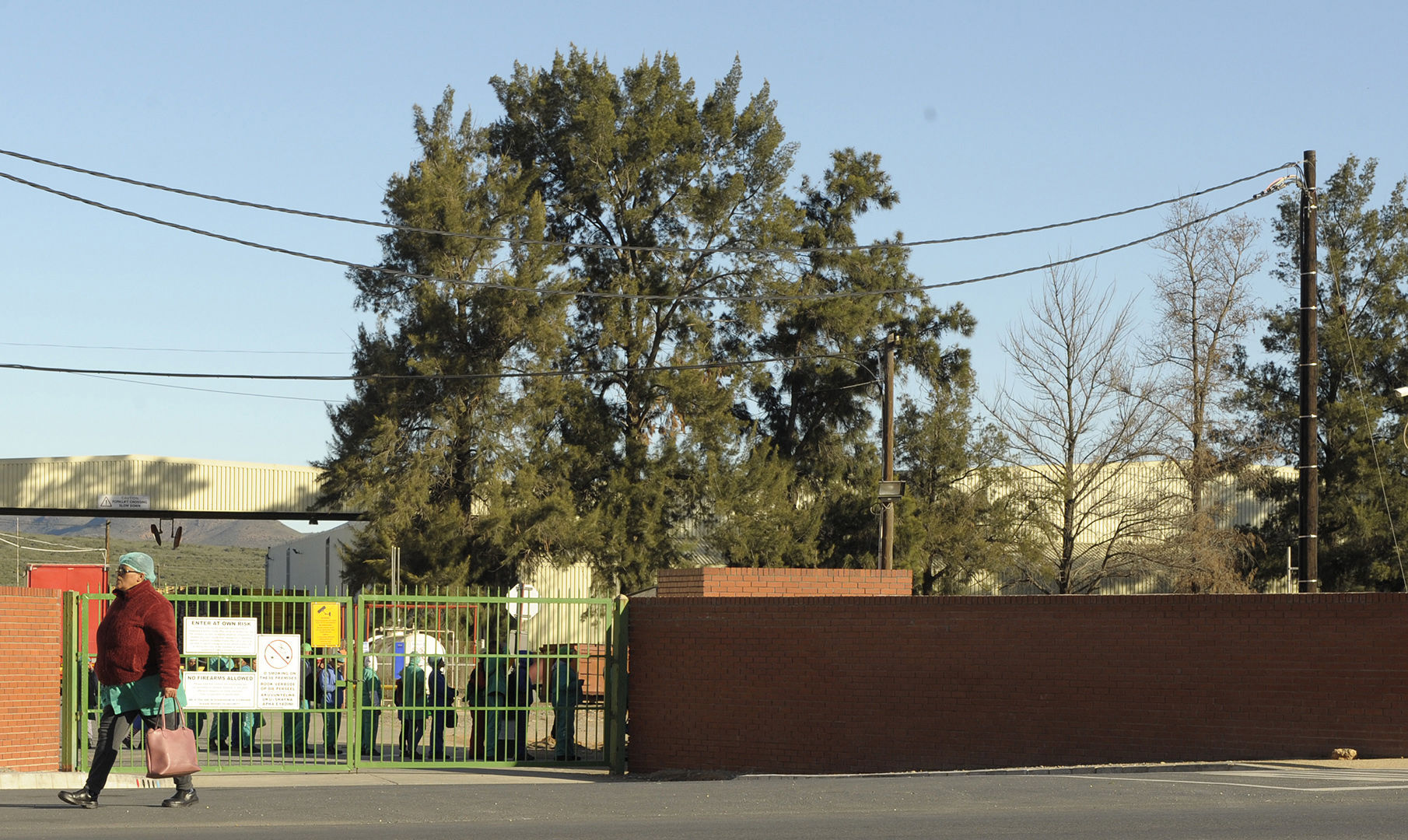
At the end of a day’s shift, workers queue to leave the gates of the Langeberg and Ashton Foods canning plant. The plant has 250 permanent employees. (Photo: Joyrene Kramer)
Factory and farm employment
The L&AF plant employs 250 permanent workers and takes on varying numbers of seasonal workers throughout the year. Seasonal employment peaks at about 4,300 individuals who work for about three weeks during the apricot-processing season, according to Tiger Brands.
In recent years, there had been a decline in the amount of work available at the factory, said Rowan van Eck, a factory worker and resident of Ashton.
“Last year, with the apricot season, it was only two weeks, and in the [previous] years, it was three weeks, four weeks,” he said.
Van Eck told Maverick Citizen that his father also works at the factory, adding that it is common for entire families to work there.
“For us not to work here was going to be a huge problem for all of us, because our children are also working here, [in] season time when the schools are closed. We all benefit from the factory,” said Jacobs.

When the imminent closure of the Langeberg and Ashton Foods canning plant was announced in June 2022, local people were panicking, according to Ferdi van Wyk, a worker at the factory. People from the local towns of Ashton, Montagu and Robertson depend on the facility for work. (Photo: Joyrene Kramer)
When it looked as if the factory would close down, people panicked, said Ferdi van Wyk, another worker. The facility not only provides jobs for residents of Ashton, but also those of Robertson, Montagu and Zolani.
But after the extension of the plant’s lifespan, many workers were now optimistic, he continued.
“Maybe there’s a better plan in the future, maybe… people [will] invest in the company so they can prolong the system.”
It is not only factory workers who will lose work if the plant is closed, but farm workers as well. Producing canning fruit is labour-intensive, said Mark Barnard, a member of the Growers Consortium.
The consortium is a collective of canning-fruit producers seeking to take over the L&AF factory.
“There is no mechanical harvesting, mechanical pruning, that’s all still done by hand,” explained Barnard.
“We have to prune in winter, you have to thin out the fruit in early summer, some of the guys do a summer pruning, and then you have to physically harvest the product. So, it’s very labour-intensive, and there’s a lot of people in this area who make their living out of working on the farms, not just [at] the factory.”

Between 160 and 220 farmers provide produce to the Langeberg and Ashton Foods canning plant, according to Grant Smuts, a local farmer and vice-chairperson of the Growers Consortium. (Photo: Joyrene Kramer)
Between 160 and 220 farmers stand to be affected by the closure, according to Grant Smuts, a local farmer and vice-chairperson of the Growers Consortium.
Breaking the cycle
Many people in the Ashton community are without work or rely on social grants, said Isaac Antonie, the principal of Ashton Secondary School. Because of socioeconomic challenges in the area, Ashton Secondary is a quintile 3 school, with no fees.
“We have this nutrition programme to help [the children], to feed them, and then we have a mobile clinic here, to come every Tuesday,” he said.

There is a need to break the cycle in the community of Ashton that sees children matriculating from school and going to work with their parents in the Langeberg and Ashton Foods canning plant, according to principal Isaac Antonie of Ashton Secondary School. He would like to see more young people leaving the community for other opportunities. (Photo: Joyrene Kramer)
Many pupils at Ashton Secondary have parents who work at the factory, either permanently or seasonally. However, the number of people employed at the factory during peak season had declined in recent years, continued Antonie.
When Maverick Citizen visited Ashton Secondary during a break between classes, there were long lines of pupils with plastic bowls and cups, waiting for a serving of soup from the school’s feeding scheme.
Antonie estimated that about 500 children rely on the nutrition programme, a number that has increased significantly over the years.
“I think at every school in our region, the increase is phenomenal. It was always 200, 300, it’s now 500, and every day it becomes more and more, more and more,” he said.

About 500 students at Ashton Secondary School rely on the school’s nutrition programme, says principal Isaac Antonie. This number has increased significantly in recent years. (Photo: Joyrene Kramer)
Sometimes, parents will approach the school asking for help to feed their children, or send pupils to ask for help in their stead.
“I got, last week, three daughters here in my office, who asked me, ‘Sir, mom sent [us] to you. We didn’t have something to eat. There’s nothing at home,’” he said.
“It’s a very hard, tough thing, and… you can’t say it’s okay, seeing that.”
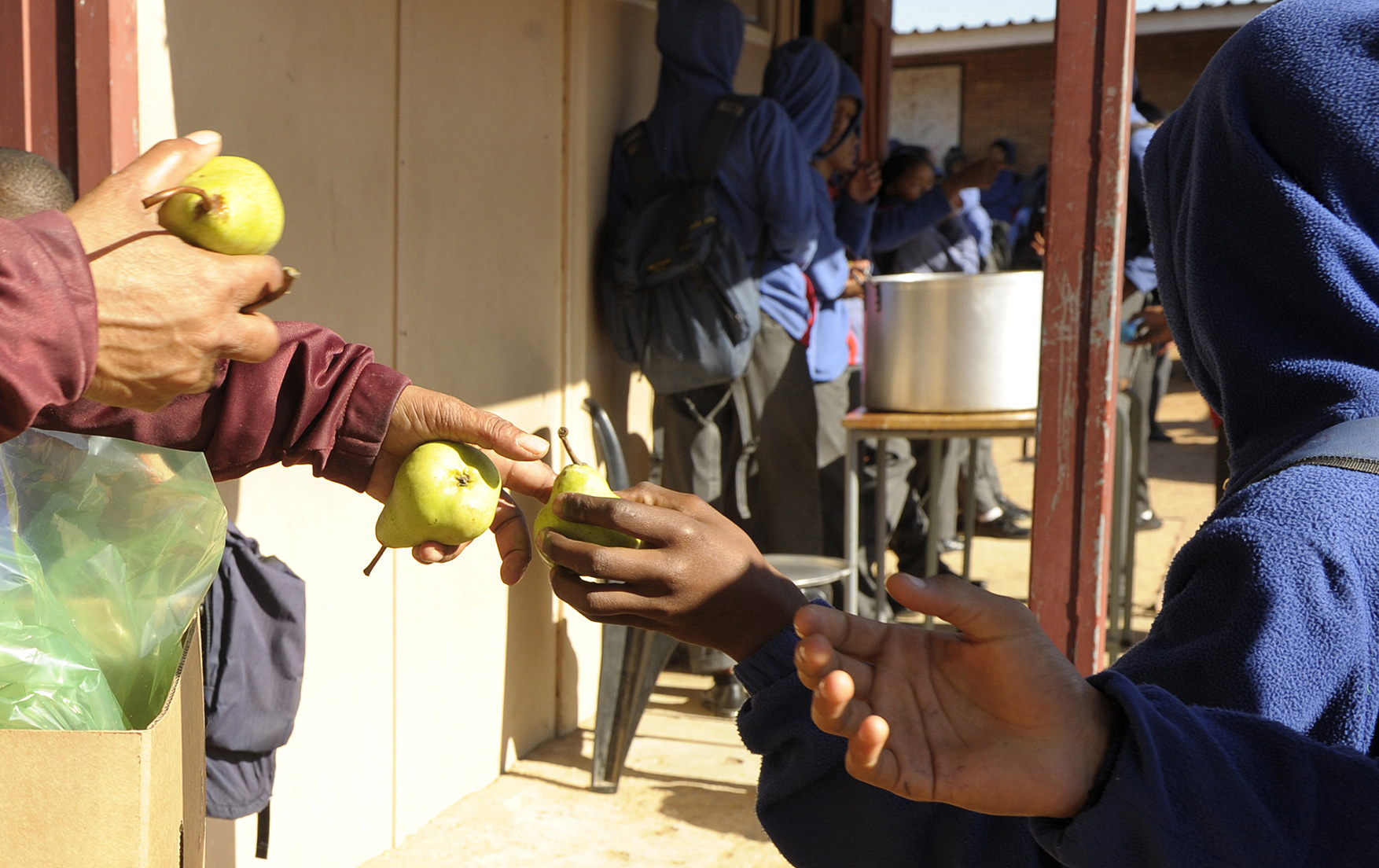
Pupils at Ashton Secondary School queue for fruit as part of the school’s nutrition programme. (Photo: Joyrene Kramer)
The closure of the L&AF plant would turn Ashton into a ghost town, said Antonie. However, even if the factory is taken over at the end of the next season, poverty will continue to exist in the community.
“I motivate my kids to focus on their academic work, and… to overcome this kind of hurdle we have now [in the form of] poverty,” he said. “The only thing we have now in our hands is our education. What [has] happened is that we can’t depend on the factory any more.”
Read more in Daily Maverick: “Eastern Cape’s Cradock part of government plan to revive small towns”
Antonie aims to break the cycle that sees children matriculating from school and joining their parents as workers at the factory. Instead, he would like to see more matriculants leaving Ashton and exploring other possibilities.
“My main vision… now is to leave no learner behind,” he said.

Pupils at Ashton Secondary School look out at the informal settlement that sits on the hill behind the school. (Photo: Joyrene Kramer)
Early childhood development
For Zenobia Titus, the principal of Tinkie Winkie Daycare, the main concern if the factory closes is that parents will keep their children at home due to a lack of money for school or crèche fees.
The daycare looks after 60 children, most of whom are dropped off by parents on their way to work at the factory. It relies on fees and community fundraisers to continue operating.
“Even the factory, at this stage, plays a huge role, because they do give us… canned fruit and also run a soup kitchen for us. So… every quarter, they are giving us food for the children,” said Titus.
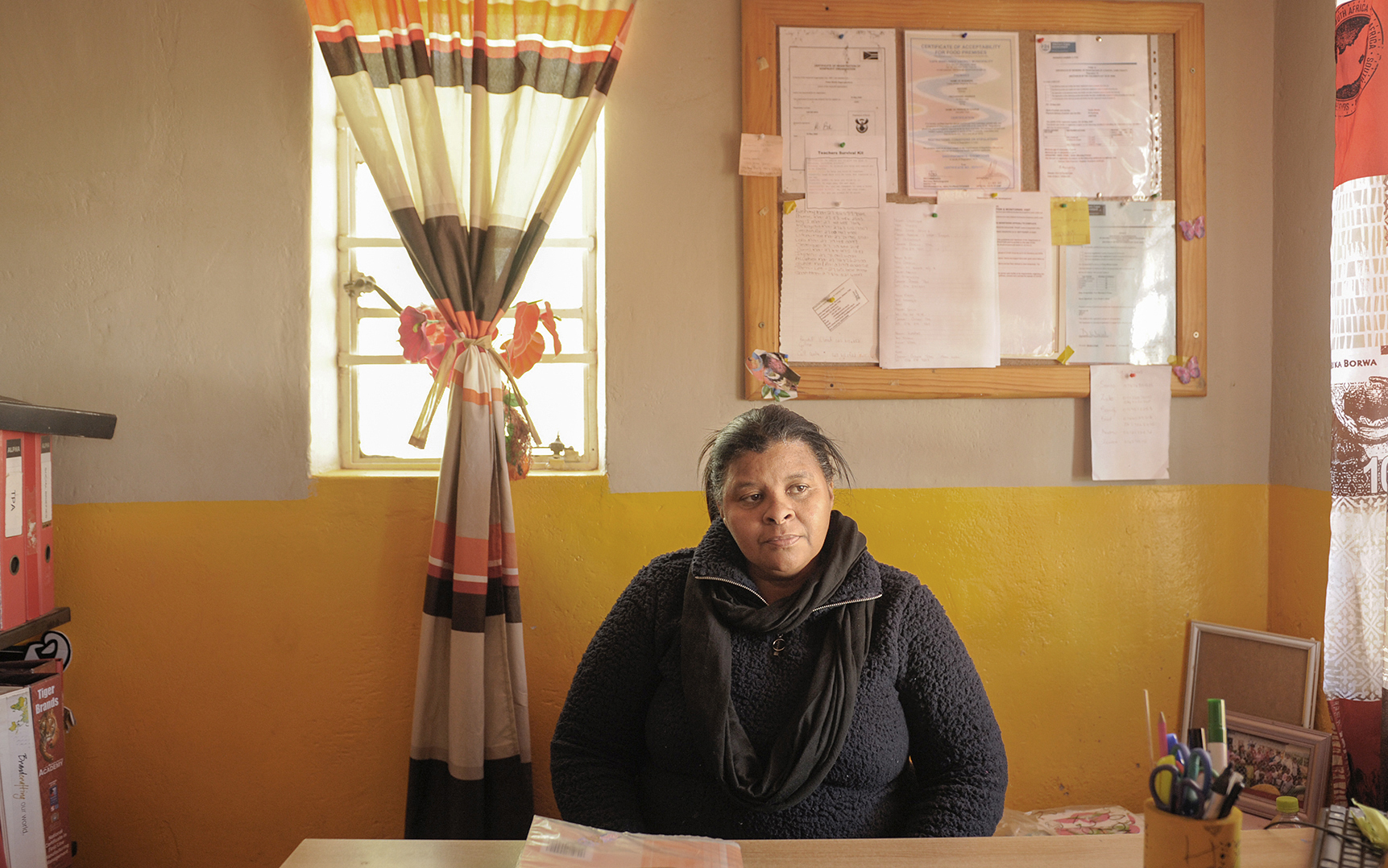
If the Langeberg and Ashton Foods canning plant were to close, more parents would keep their young children at home, due to a lack of money for school and crèche fees, according to Zenobia Titus, principal of Tinkie Winkie Daycare in Ashton. (Photo: Joyrene Kramer)
Some parents have already reached out to Titus, saying that if the factory closes, they will be unable to pay the daycare’s fees.
“It’s going to have a huge impact because some of the children, at home, they are not safe and there’s nothing to eat, but here they get a proper meal,” she said.
“At home, there’s no money to buy food, but here, at least the parents know they do receive something.”
Local business
Since the lifespan of the L&AF factory was extended, the people of Ashton are more relaxed and willing to spend money, according to Suzanne Nel, a local business owner.
“For a few weeks [before that], it was so tense, everything. There was no business,” she told Maverick Citizen.

When it looked as if the canning plant was going to close, people in the Ashton community stopped spending money, according to Suzanne Nel, local business owner. Only since the plant’s life was extended has business picked up again. (Photo: Joyrene Kramer)
Most local businesses are connected to the factory. For almost 21 years, Nel has done catering work for the plant, providing platters when they host visitors.
“It will influence my business a lot [if the plant closes],” she emphasised.
At the local butchery, which has served the Ashton community since 1965, the possible closure of the factory was a source of great concern, said Jeanne Heunis, wife of the owner. She estimates that about 60% of the butchery’s business comes from those who work at the plant.
“It’s like a lifetime commitment from them to come to the butchery,” said Heunis. “There’s a relationship. We know all the people from the factory – it’s like family. They are really supporting us.”
While local residents remain worried about the future, they are also optimistic about the survival of the factory beyond the end of the season.
“We have to be [optimistic],” said Heunis, “because this is our life.” DM/MC




















 Become an Insider
Become an Insider
What’s not explained is why this factory is failing. Is it bad management? Has the world no interest now in canned and pureed fruit? Are South African products being shunned because of our support for Russia? Have the trade unionists been hard at work to secure unrealistic salary increases that have brought the company to its knees?
Personally I have little faith in Tiger Brands. They produce some of the most unhealthy foods like Oros and Ace super refined mealie meal, white rice and polony that contribute directly to the malnutrition, obesity and diabetes in South Africa. Clearly that’s where the profit is.
They may have sold the polony division but we have not forgotten about the listeria outbreak from using gross imported meat.
This is surely an opportunity for a company seriously interested in good food to buy the canning factory and ditch the Tiger Brands label that may well be the cause for its demise; personally I view any Tiger product with suspicion, but then I’m a health nut.
Canned fruit may not be as good as fresh fruit but it is still an excellent food and most SAffers don’t have access to fresh fruit. Coupled with an emphasis on recycling the cans, it’s no misfit with the green movement and healthy food as so many other Tiger brands are.
Agree this article needs to be balanced with understanding reasons why Tiger wants to close it.
I am sorry to agree that daily maverick has not told the complete story…. Which where possible, is where your duty lies. Does it not suit your narrative or position to explain the most important thing…. WHY.
DM, you need to up your game. This is such a half baked story. Where were the editors?
Thanks for nothing, Gerrit. How about some positive, practical suggestions? Armchair critics are the pits.
It has already been said by other commentators. Assume you were standing up when you penned your reply?
What an opportunity!! The union and the local farmers get together, establish a cooperative entity, lean on Tiger Brands (bastards!) to generously fund the change-over. Everybody wins: the workers keep their jobs; the farmers keep their market; the union gets to put its money where its mouth is with regard to contributing to running a real business; farmers and workers ‘find’ each other by working closely together in the new venture; Tiger Brands partially rescue their crappy reputation as bloodthirsty exploiters (at absolutely minimal cost to their gigantic commercial empire); Ashton does not become a ghost town. What’s not to like?